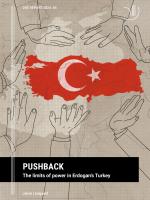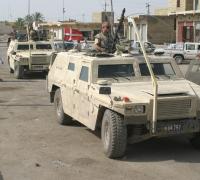Pushback: the limits of power in Erdogan's Turkey
There is a widespread perception these years that strongmen around the world are winning, posing new geopolitical challenges and threats to the Western liberal order and security architecture.
This DIIS Report takes a closer look at one of these strongmen, Turkey’s Recep Tayyip Erdogan. The picture it paints, however, is not one of confidence and strength. Rather, the statements and actions of Erdogan and Turkey increasingly seem to be born of the frustration that increasing pushback against both him and his Turkey elicits. The report unfolds how and why this is.
Initially driven by a peculiar mix of confidence and insecurity, overreach has increasingly led to pushback, and the pushback has led to a series of policy U-turns in recent years. The report opens with an attempt to try to make sense of these U-turns. Tapping into the Turkish nationalism to retain power around 2015, Erdogan initially succeeded in turning the pushback from both within and outside Turkey to his advantage. However, the system and policies developed to stem the initial pushback fostered further pushback and eventually began to grate away at both his and his Turkey’s powers. The first chapter unfolds how this is.
Asking why brings to the fore forms of pushback working in the background, as it were. Chapters two and three try to make one structural and two geopolitical forms of implicit pushback explicit. The structural form of pushback is a series of inherent, systemic weaknesses of strongmen autocratic systems that over time come to challenge the initial popularity of the strongman stance.
The first of the geopolitical types of pushback originate in longstanding Turkish geopolitical particulars as well as Turkey’s status as a middle power brought out through the case of Turkey’s complicated NATO-membership as well as through Turkey’s relative isolation on its threat perceptions. The second of the two types of pushback is more contemporary. Here the report argues that the widespread perception that strongmen around the world are winning in an increasingly bi-, multi-, or a-polar world seems to come up against a less alarmist look at the facts. On this alternative view, the world is becoming increasingly unipolar, and the room for manoeuvre for a country such as Turkey is narrowing. This is especially true when it comes to economic strength, as the report argues, but also applies to other sources of strength.
As such Turkey is likely a different and more intractable challenge to NATO and the West than what is perhaps often portrayed. The report finishes with what it dubs a ‘peaking power dilemma’ that faces Erdogan and Turkey, and what lies at the heart of the frustration and U-turns driving Erdogan and Turkey today.


